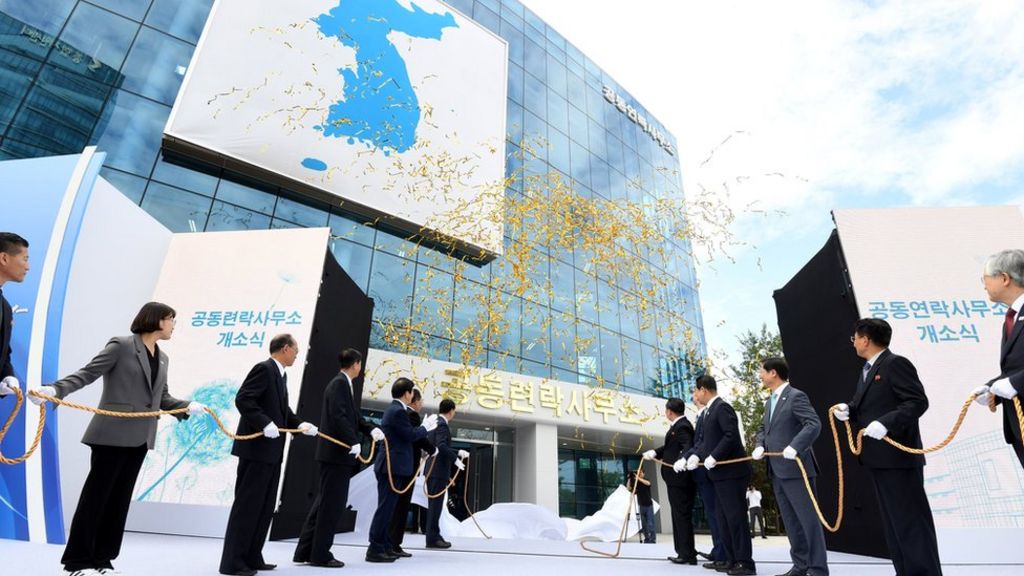On Tuesday 16 th June 2020 at 05:49 GMT, North Korea blew up its joint liaison office with South Korea in Kaesong, an industrial township on its side of the border in an alarming and a serious incident that shook the relations between the Democratic People's Republic of Korea(DPRK or North Korea) and the Republic of Korea (RoK or South Korea), without them actually going to war.

The move had been made in light of the recent deterioration in relations between Pyongyang and Seoul. Pyongyang's aggressive action, thus damaging the slow, diplomatic progress being made between DPRK and RoK long since the 1950 Korean War with comparatively small disputes here and there, has made the future of the Korean Peninsula uncertain. The fact that aggravates the situation further is the significant involvement of superpowers like the United States of America and People's Republic of China in the Korean Peninsula in the past years which has been continuing to the present.
The tensions between the two countries had soared after Pyongyang objected to activists and defectors in South Korea sending anti-North Korean propaganda leaflets, rice and Bibles using balloons across the border into North Korean territory, and had cut off communication with Seoul following Kim Yo-jong, sister of DPRK Supreme Leader Kim Jong-un, openly displaying and portraying an aggressive stance against South Korea and threatening military action just a few days before the incident. Experts bring another interesting theory into the mix explaining that North Korea's frustrations might be aimed at South Korea's inability to revive inter-Korean economic projects that had been economically beneficial to Pyongyang, under pressure from the US, along with UN sanctions. It has long been seen that Pyongyang often targets South Korea to portray its frustration towards the United States, an ardent supporter of South Korea in the Korean Peninsula, in response to any sanctions put on it or to extract concessions from South Korea. This incident may not be an exception to this well-known tactic of North Korea.
South Korea's President Moon Jae-in called for an urgent national security meeting following the demolition. The country's Unification Ministry called the incident "a senseless act", one that had "destroyed the hopes of those who wished for peace on the Korean Peninsula" and saying so, the Government of the Republic of Korea also threatened that they would "respond strongly" to the armed aggression if the situation were to worsen but did not elaborate on how it would retaliate.
Following the blowing up of the liaison office, North Korean state media KCNA announced that Pyongyang will be deploying troops in demilitarised areas, including in the Kaesong industrial zone. The KCNA also stated that North Korea will be adding artillery units along the border with South Korea for reinforcement and North Korean police posts that had been withdrawn when relations had improved between the two countries will now be reinstituted. It seems a pretty blunt signal has been put forward to the international community that North Korea is slowly going down the path of aggression. Although a key international actor, Mr. Vladimir Putin, President of the Russian Federation has asked for restraint from both sides, it looks like North Korea hasn't really taken up the suggestion.
North Korea's recent action has been the most provocative in recent years. It looks like President Moon Jae-in's efforts over the past few years to improve relations with Pyongyang have been brought to a stand-still with the reignition of the old rivalry between the two neighbour countries.
Experts believe these actions, however provocative, are not severe enough for Seoul to carry out military aggression in retaliation. Following the demolition, Reuters reported that the US was coordinating with South Korea. Hours after the incident, China's Foreign Ministry spokesman Zhao Lijian announced in a daily briefing that China hoped for peace on the Korean Peninsula but did not mention the liaison office. Since only a little time has passed since the destruction of the liaison office, it is yet to be seen whether this issue will be resolved diplomatically or the Korean Peninsula will again be the ground zero of a huge military conflict between not only the Democratic People's Republic of Korea and the Republic of Korea but also global superpowers who will use these nations as their proxies in a battle for domination of global geopolitics.